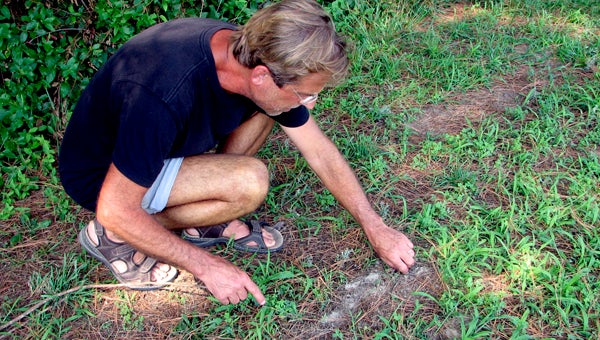Know your nuisance: Voles
Published 7:15 pm Thursday, July 14, 2011

Johnson’s Gardens owner Tim Johnson points out evidence of a vole tunnel in his yard. He said patches of displaced dirt as well as holes in your yard are good indicators voles are tunneling in your garden.
Editor’s Note: This is the second in a series of stories about garden nuisances. Watch the Home & Garden section on Fridays for the reminder of the series.
Voles are often confused with moles because they look similar and both make underground tunnels, but the biggest difference between them is that voles spell doom for your plants.
Unlike moles, which just rummage through the dirt searching for grubs and bugs to eat, voles love to munch on the roots of flowers, shrubs, bushes and trees.
Their appetites can kill a plant before a gardener even notices a problem.
Johnson’s Gardens owner Tim Johnson said he gets more complaints from his customers about voles than any other garden nuisance.
“It’s a pest that is particularly bad because they are hard to get rid of,” he said. “They eat plant matter; that’s why they are such a hazard to the gardener.”
Johnson said once a vole has made a home of your yard, it’s tough to get rid of them because they breed rapidly.
There are 23 different species of voles in the United States, but the most common species in the Hampton Roads area is the pine vole.
Many people mistake them for moles, but pine voles are smaller, with bodies about 3 to 5 inches long, and usually have small tails.
They eat a variety of plants, but Johnson said two of their favorite plants are hostas and nandinas.
You know you have voles if you see a lot of displaced dirt and holes in your yard or your plants are easy to pull out of the ground, he said.
Voles can cause a lot of damage to plants by chewing on their roots, and because they burrow, it’s tough to catch them in the act.
Johnson said it is hard to trap them because they are so small. And you cannot use rat poison to control them because it is illegal in Virginia to poison any animal except mice and rats on your property.
Johnson said the best way to get rid of voles in your yard is by using a product called Permatil VoleBloc.
He said Permatil’s main use is to open up the soil to allow for easier watering, but many gardeners found it to be effective in protecting yards against voles.
VoleBloc creates a barrier that voles cannot burrow through and keeps them away from plant roots.
Johnson said in addition to VoleBloc, putting down mulch or even stones in your garden can prevent voles from making trouble.
He said they tend to have tunnels close to the ground and anything that impedes their tunnels can keep them from making dinner of your plants.
Johnson also said keeping your garden bed clean can help you detect vole activity and handle it sooner rather than later.


